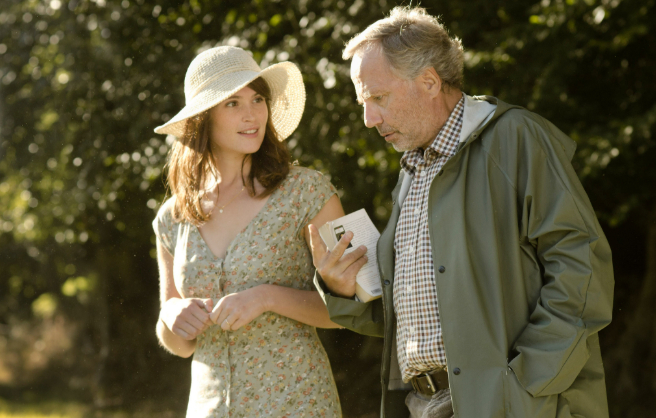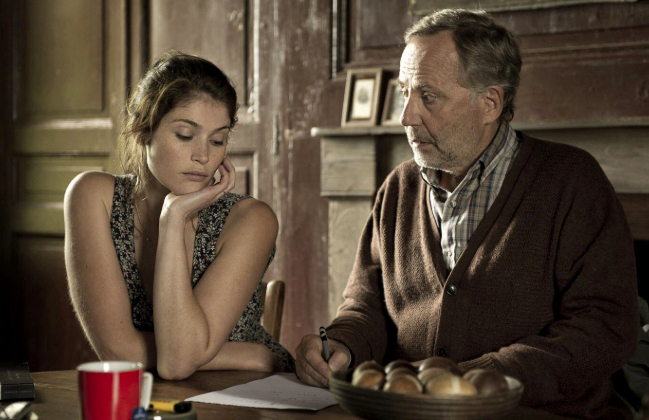Gemma Bovery (2014)
Directed by Anne Fontaine, Gemma Bovery is a French-English dramedy that adapts Posy Simmonds’ graphic novel, which itself is a clever, postmodern reworking of Gustave Flaubert’s Madame Bovary. But this isn’t merely a retelling. It is a film that blurs fiction and reality, author and character, France and England — all under the gently burning sun of the Normandy countryside.
Released in 2014, Gemma Bovery stars Gemma Arterton as the titular heroine — a modern British woman who moves to a sleepy French village only to find herself mirroring the fate of the literary icon whose name she bears. Opposite her is Fabrice Luchini, a retired Parisian publisher turned obsessive narrator, who watches her life unfold with the excitement and dread of a reader watching a beloved tragedy play out once again.
🖋️ Plot: When Fiction Becomes Fate
Martin Joubert (Luchini) is a cultured, world-weary baker who lives a quiet life in Normandy. He is a man who once adored Flaubert and who, perhaps too eagerly, sees the world through literary parallels. When Gemma and her husband Charles move into the neighboring farmhouse, Martin is struck by more than just her beauty — he’s haunted by her name, her restlessness, her bookish sighs, and her palpable discontent.
To him, she is Madame Bovary. And slowly, his gaze begins shaping the narrative — even if reality has other plans.

Gemma, meanwhile, is neither caricature nor victim. Arterton’s portrayal lends her depth and agency: she’s sensual, confused, idealistic, and deeply flawed. Her flirtations, affairs, and disillusionments unfold not as a tribute to Flaubert, but as a modern woman trying to define happiness in a world that constantly projects its stories onto her.
🎭 Performances: A Dual Lens of Irony and Tragedy
Gemma Arterton is luminous. She infuses Gemma with warmth and intelligence, making her more than just a tragic echo. There’s vulnerability in her daydreaming, sharpness in her wit, and a grounded sensuality that makes every gaze — especially Martin’s — feel earned, and intrusive.
Fabrice Luchini, on the other hand, offers a performance that is simultaneously humorous and pathetic. His Martin is at once endearing and disturbing — a man who cannot help but cast Gemma into a narrative he has already read. His obsession is not just with her, but with control, with authorship. In the end, he is as unreliable a narrator as Flaubert himself.

Their dynamic is not romantic — it’s literary voyeurism, a relationship shaped by ink, not intimacy.
🎨 Aesthetic & Direction: French Pastoral Meets British Irony
The film’s tone balances delicately between satire and melancholy. Anne Fontaine handles this with restraint. Gemma Bovery isn’t laugh-out-loud funny, but it smirks. It’s a comedy of manners layered atop a tragedy of expectations.
Cinematographer Christophe Beaucarne captures the idyllic charm of the Normandy countryside with a painterly eye: sun-soaked markets, crumbling stone houses, fields of golden wheat. Yet beneath the postcard-perfect surface lies a current of unease — beauty, here, can be a trap.
✍️ Literary Themes: Projection, Desire, and Female Autonomy
Gemma Bovery thrives on intertextual play. Fontaine and screenwriter Pascal Bonitzer lean into the idea of male narration — how men, like Martin (and Flaubert), shape and sometimes distort women’s lives through the lens of literature.
Gemma is constantly being read — by Martin, by her lovers, by viewers. The film asks, with increasing urgency: what happens when a woman is denied the right to write her own story?

By the final act, the answer is as tragic as it is inevitable — and yet, Fontaine never loses touch with empathy. The film mourns Gemma not because she mimicked a literary archetype, but because she wasn’t allowed to be anything else.
🎼 Score & Sound
The music by Bruno Coulais is soft, melancholic, and slightly whimsical — perfectly tuned to the film’s bittersweet mood. There are moments of silence, broken by rustling leaves or the clinking of wine glasses, that feel more revealing than dialogue.
⚖️ Verdict: A Feminist Echo Wrapped in Satire
Gemma Bovery is a rare film that honors its literary source while subverting it. It’s about the dangers of narrative control, the thin line between admiration and objectification, and the sadness of seeing real people through fictional frames.

To some, it may feel slight or overly clever. But for viewers attuned to its nuances — its blend of comedy, critique, and quiet tragedy — it is rich, intelligent, and quietly haunting.
Rating: 8.2/10
“A wry, wistful exploration of how stories shape — and sometimes destroy — the people trapped inside them.”
#GemmaBovery #GemmaArterton #AnneFontaine #LiteraryCinema #FrenchFilm #MadameBovaryReimagined #FeministCinema #FabriceLuchini #GraphicNovelAdaptation #CinemaAndLiterature
